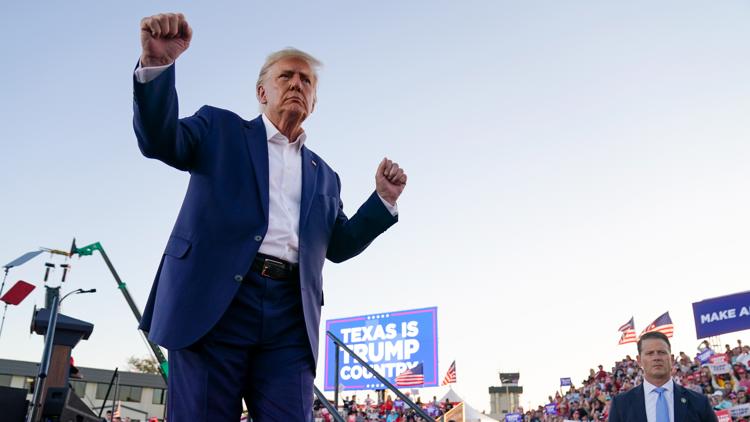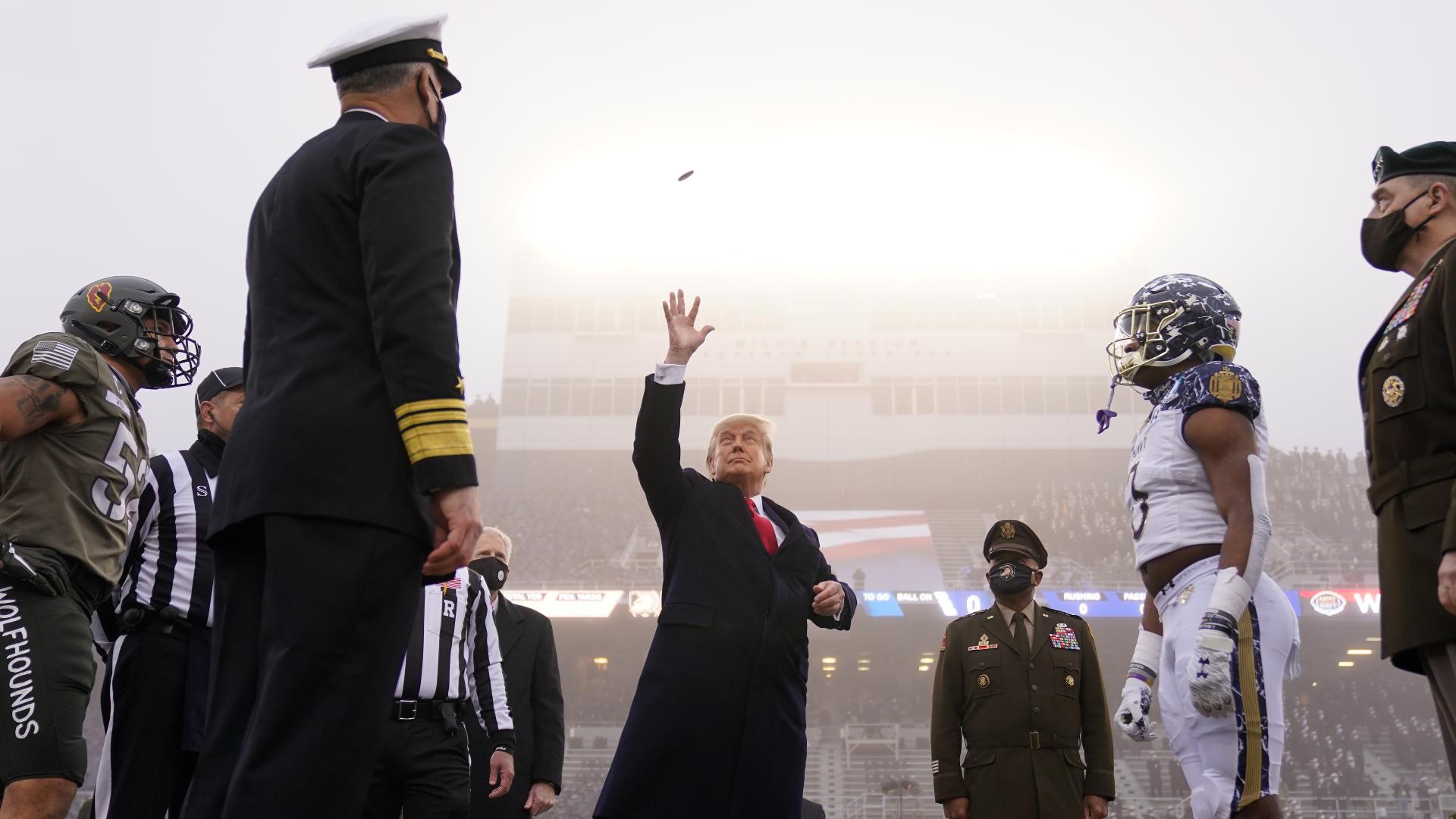Less than a year ago, Donald Trump's political strength was waning among Texas Republicans.
He was being blamed for an underwhelming midterm election, he was facing mounting legal problems and many prominent Texas Republicans were hesitating to endorse his comeback bid.
But not all of them.
U.S. Rep. Wesley Hunt of Houston endorsed Trump in a statement sent out to reporters before Trump had even finished his November 2022 speech at Mar-a-Lago, announcing his campaign to take back the White House.
Loyalty was Hunt’s main motivator, he said in an interview with The Texas Tribune. Trump backed him in both his 2020 and 2022 primaries. Perhaps more importantly, his constituents "wanted President Trump, and it wasn't even close."
What happened next in Texas is much like what happened elsewhere: Republican officials started 2023 open to a Trump alternative but ultimately came around as DeSantis underwhelmed and Trump appeared increasingly inevitable. Those endorsements — their order and intensity — could prove to be consequential for those Republicans in the country’s biggest red state as the famously transactional president and his allies look to the future.
"They're a complete joke," Hunt said of Trump’s Texas endorsers in recent months. "If you're endorsing President Trump by the time he's up 60 points, you're not a serious person."

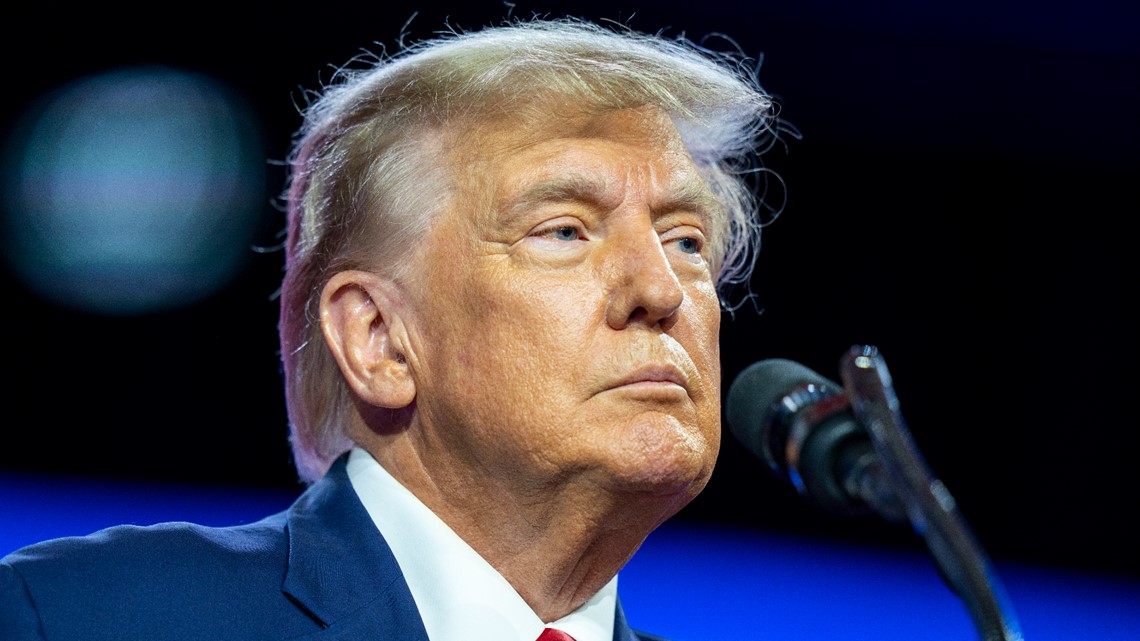
While polls once showed Trump and DeSantis tied in Texas, they now suggest the primary is all but over here. A survey released last month by the University of Houston found Trump leading former South Carolina Gov. Nikki Haley 80% to 19%, with just 1% undecided.
It has been sweet vindication for Trump’s earliest backers in Texas, like Agriculture Commissioner Sid Miller. Miller declared himself the first statewide official to endorse Trump for 2024 — at a Trump rally two years ago in the Houston suburbs.
“Eventually [other state GOP leaders] just kind of saw the writing on the wall,” Miller said in an interview. “Trump was gonna be the nominee, might as well get on the train before it leaves the station.”
Perhaps the most revealing Texas endorsement came shortly after Trump won the New Hampshire primary last month. Two minutes after NBC projected Trump the winner, U.S. Sen. John Cornyn, R-Texas, took to X, formerly known as Twitter, and lent his support.
“I have seen enough,” Cornyn said.
Cornyn had spent much of 2023 expressing interest in a post-Trump direction for the GOP and saying he did not plan to endorse in the primary regardless. Cornyn even said in May that he thought Trump’s “time has passed him by.”

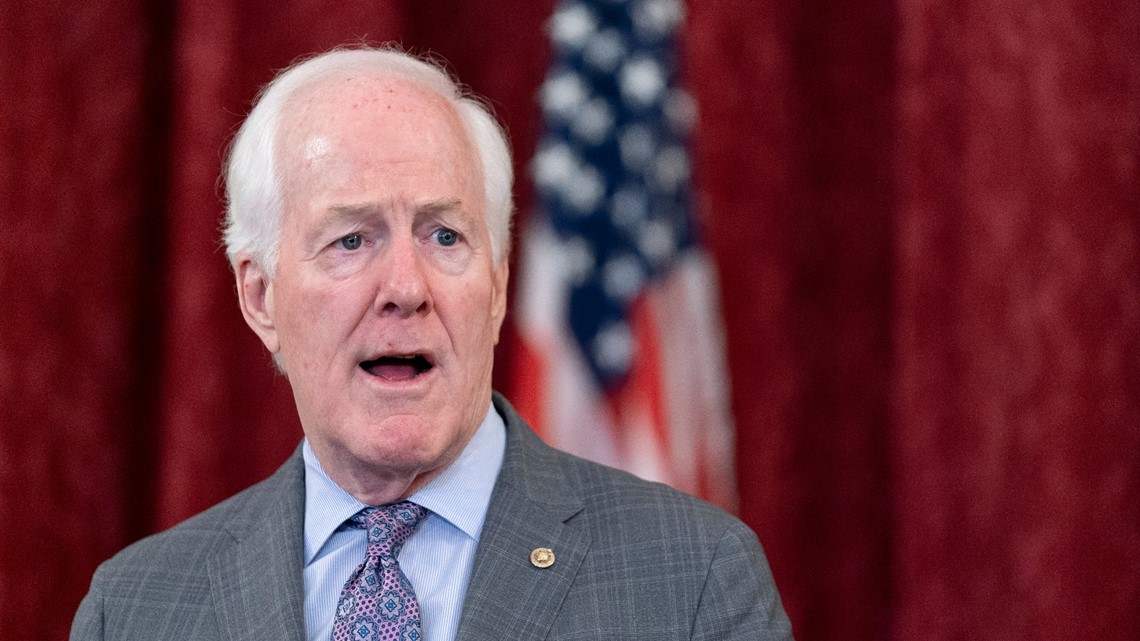
But Trump’s vanquishing of the primary field appeared to sway Cornyn, who also has his own personal political considerations. He is up for reelection in 2026 and has made no secret he wants to be Senate majority leader one day.
Now Cornyn is helping host a major Trump fundraiser next month in Washington, D.C., along with U.S. Sen. Ted Cruz and most of Texas’ House GOP delegation, including two new supporters, Reps. Dan Crenshaw and Jake Ellzey.
The DeSantis promise
After the 2022 election, DeSantis was the hottest thing in Texas GOP politics. Abbott’s critics — Republicans and Democrats — were comparing everything he did to the Florida governor. Polling showed DeSantis was tied with Trump in a hypothetical primary matchup. And after Trump suggested abortion laws like Texas’ were hurting the GOP at the ballot box, some state GOP leaders did not hesitate to push back.
When Trump announced his comeback campaign in November 2022, the only Texas officials who endorsed him were his most diehard allies beyond Miller: Attorney General Ken Paxton and three members of the congressional delegation: Hunt and Reps. Ronny Jackson of Amarillo — who served him as White House doctor — and Troy Nehls of Richmond.
Lt. Gov. Dan Patrick, who had chaired Trump’s 2016 and 2020 campaigns in Texas, only praised Trump’s announcement speech in a Facebook post, stopping short of a clear-cut endorsement. He later made his support more explicit and is again serving as Trump’s Texas campaign leader.

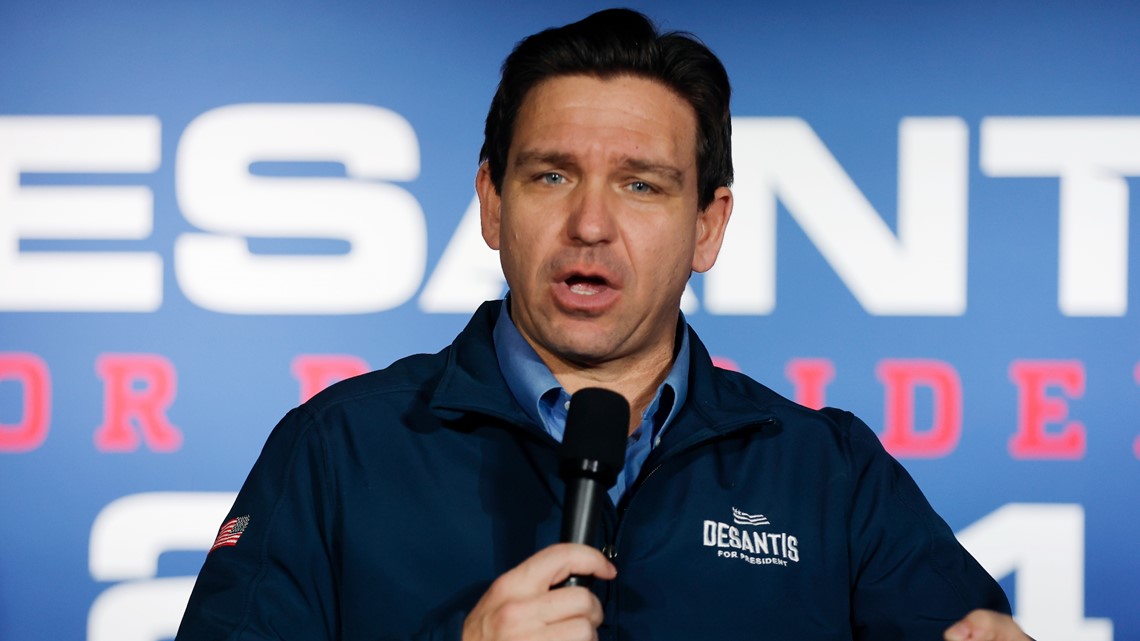
DeSantis made a highly anticipated swing through the state in March, headlining two county GOP fundraisers in Dallas and Houston. He lavished praise on Texas’ conservative policies, received facetime with major Texas GOP donors and got laudatory introductions from people like state Sen. Brandon Creighton of Conroe. Creighton, the chair of the Senate Education Committee, had traveled to Tallahassee to meet with DeSantis about education issues weeks earlier.
It was the apex of DeSantis’ popularity among Texas Republicans.
By mid-March, U.S. Rep. Chip Roy, R-Austin, endorsed DeSantis even though he had not announced yet, making him the first member of Congress anywhere to back DeSantis.
But the Trump campaign was already moving to snuff out any traction for the Florida governor in Texas. Trump was planning to visit Waco for a rally in late March, and his campaign wanted to announce a major round of Texas endorsements ahead of it.
In the days before the Waco rally, Trump’s earliest Texas supporters got to work. Hunt and Jackson worked the delegation in coordination with the Trump campaign, making clear the Waco rally would be a defining moment to get onboard in Texas.
Hunt said he sent his chief of staff into a meeting with other Texas GOP staffers, carrying a simple message: “You need to endorse him by this week or you will not be part of this team.”
Trump picked up eight new Texas congressional endorsers ahead of the Waco rally and included them in the announcement of a “Texas Leadership Team.” Trump repaid the favor last week, doling out reelection endorsements to all 13 endorsers and noting each was an “original member” of the team.
DeSantis got another chance to make an impression on Texas congresspeople when he visited Washington, D.C. for a reception the next month. While Cornyn attended, he insisted he was still neutral, and one of the members who had declined to endorse Trump before the Waco rally, U.S. Rep. Lance Gooden of Terrell, left the DeSantis reception and announced his support for Trump.
Ultimately, DeSantis got endorsements from only three elected officials in Texas: Roy, state Rep. Matt Schaefer of Tyler and Bexar County Commissioner Grant Moody.
Roy especially stood out, making multiple trips to Iowa to campaign for DeSantis in the homestretch and defending the Florida governor against Trump’s attacks. That drew fierce criticism from Trump, who openly asked for primary challengers to Roy in December despite the filing deadline passing and Roy drawing no opposition.
Consolidation
For most of the summer and fall, the primary was quiet in Texas. DeSantis visited Eagle Pass in June to announce a border plan with Roy, and while Schaefer announced his endorsement of DeSantis that day, other elected officials continued to stay on the sidelines.
U.S. Sen. Ted Cruz, whose top strategists had gone to work for DeSantis, swore neutrality in the primary but said in August he saw a two-man race between Trump and DeSantis.
Then, in November, the dam started to break again.
Gov. Greg Abbott had never fully embraced Trump, often skipping the president’s rallies in Texas and letting other statewide officials have the pro-Trump spotlight. But by November, he saw the writing on the wall and figured if he was going to endorse Trump by then, he might as well do it in a way that left an impression on the famously transactional former president.
So Abbott invited Trump to the Rio Grande Valley, where they served Thanksgiving meals to state troopers there and Abbott gave a speech praising Trump’s legacy on border security. Speaking after Abbott, Trump indicated he knew Abbott was a big get.
“He’s not free and easy with endorsements,” Trump said.

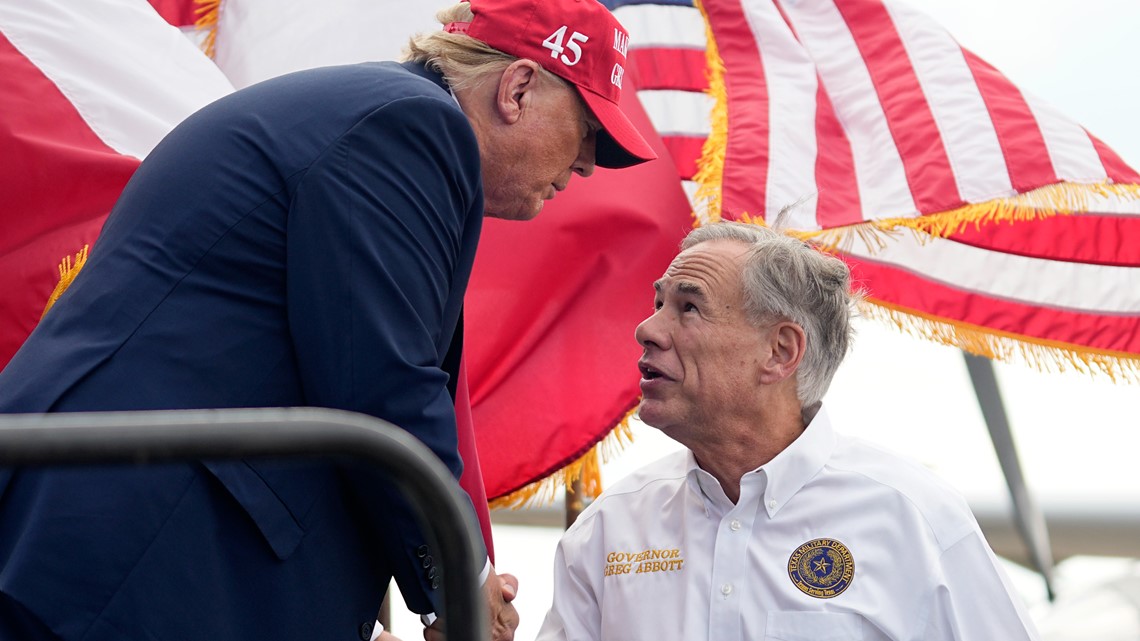
Abbott’s endorsement caught some by surprise — and seemed to spur a regrouping among Texas Republicans who had cheered on DeSantis in a previous era. Don Huffines, the 2022 Abbott primary challenger who regularly called DeSantis’ COVID-19 response superior to Abbott’s, issued a Trump endorsement shortly after the Valley trip was announced.
With Abbott in his corner, Trump cranked up the heat on Cruz, using his Truth Social media platform in early December to threaten to jeopardize Cruz’s reelection campaign. But Cruz held firm on staying out of the primary.
DeSantis was a friend, and plus, some of Cruz’s top political staffers over the years were working on the DeSantis campaign or for a pro-DeSantis super PAC . A top Cruz adviser, Jeff Roe, was leading the super PAC, Never Back Down, though he resigned in mid-December amid staff infighting.
Cruz chose to give DeSantis until Iowa, leaning on his own reverence for the state’s political process as the winner of its 2016 caucuses. Trump romped in Iowa, and the next night, Cruz endorsed Trump in a Fox News interview.
“I like Ron. He’s a friend of mine. He was a great governor of Florida — he still is a great governor of Florida,” Cruz said on his podcast that week. “He doesn’t have a path anymore.”
DeSantis dropped out days later.
Haley donors
Now Haley is making a last stand against Trump — and Texans are playing a major role.
Haley retains the support of some of the state’s biggest Republican donors, including Harlan Crow — the billionaire who has been accused of bankrolling Supreme Court Justice Clarence Thomas’s lavish lifestyle — Ross Perot Jr. and John Nau. They are on the host committees for a fundraising swing that Haley is making through Texas later this month, hitting Houston, Dallas and San Antonio.
A pro-Haley super PAC has also counted Texans among its top givers recently. The Dallas oil billionaire Ray Hunt and his wife Nancyhave given a combined $1.2 million to the group, including half that as recently as late December.
Betsy Price, the former Fort Worth mayor who has long backed Haley, said Haley’s Texas supporters are “tired of all the drama” that comes with the former president.
“They’re tired of all the melee following Trump around,” Price said. “Whether it’s right or wrong, it’s there. It’s a distraction from the issues.”
Haley’s Texas supporters know her path forward is very tough. Price said she “needs a good showing” in South Carolina — not necessarily a win — and “just has to take this one primary at a time.”
Haley also has the backing of former U.S. Rep. Will Hurd, R-Helotes, who ran for president earlier in the cycle. He endorsed Haley when he dropped out in October and has been stumping for her, including at a “Women for Nikki” event last month in Dallas.
Hurd, in a statement, said he will continue stumping for Haley “because she's the last best hope we have to ensure we don't have a rematch from hell.”
“I’m gonna support him”
One by one, the political dominoes have fallen in Trump’s favor over the past two months. Creighton endorsed Trump in mid-December. Texas GOP chair Matt Rinaldi, a one-time DeSantis fan, endorsed Trump after the New Hampshire primary, saying it was worth an exception to the neutrality that is expected from state party officials.
To be sure, the Texas GOP is still not fully unified behind Trump. About a third of the Republicans in the congressional delegation have not endorsed him yet, and at least one statewide official, Comptroller Glenn Hegar, has stayed silent on 2024.
Hegar, who did not respond to a request for comment, said in the fall of 2022 that he was hoping Republicans would “have a different slate of leadership” for their next presidential primary.
At the same time, some prominent Texas Republicans are not just backing Trump again but also deepening their support. Tim Dunn, the far-right megadonor from Midland who recently sold his oil company, gave $5 million to a pro-Trump super PAC in December — his biggest disclosed political contribution ever, let alone to Trump.
For some Texas Republicans who were hopeful for a Trump alternative, the process has been a little dizzying.
Take for example House Speaker Dade Phelan, R-Beaumont, who notably spoke out after the 2022 election about the negative effect he believed Trump was having on down-ballot candidates. It was a critique he never publicly revisited as Trump bounced back, and now Phelan is having to brush off any tensions with Trump in his own primary, where the House’s 2023 impeachment of Paxton, a top Truly ally, is an animating issue.
“I don’t have a problem at all,” Phelan said at a campaign stop last month. “I voted for President Trump twice. I’ll vote a third time.”
Last week, Trump endorsed Phelan’s primary challenger, David Covey, saying Phelan’s recent comments did not “mitigate the Absolute Embarrassment” of Paxton’s impeachment.
While some donors are still holding out hope for Haley, others are resigned to a Trump nomination.
Denton lawyer Tom McMurray had given $1 million to a super PAC supporting former New Jersey Gov. Chris Christie in June. McMurray did not agree with Christie on everything but liked how he was going toe-to-toe with Trump.
McMurray said he did not expect the primary field “to just clear out in one quarter.”
“Clearly I’m going to support the Republican nominee over anything the Democrats are going to put up,” McMurray said. “I don’t know if I’m going to get a choice past South Carolina, but at the end of the day, I’m gonna support him.”
Even Roy, who was critical of Trump as a DeSantis surrogate, has said he will support the Republican nominee. He has not formally backed Trump yet but has downplayed any acrimony with the former president since DeSantis exited.
“That’s the sort of kiss-the-ring mode, and, like, I don’t do that,” Roy said in a Fox News interview Thursday when asked about Trump’s demands for support. “He knows that. He respects that. And by the way, Rick Perry called him a cancer and the next year, he was the secretary of energy. I think we’ll be just fine.”
The Texas Tribune is a nonprofit, nonpartisan media organization that informs Texans — and engages with them — about public policy, politics, government and statewide issues.
>MORE TEXAS POLITICS NEWS:


